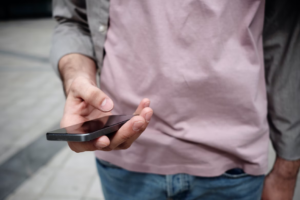Your relationship with screens and mental health

Our relationship with screens has changed dramatically since the launch of the iPhone in 2007. In the past decade and a half, our phones, tablets, and TVs have transformed from specialized devices to digital utility tools that can be used for entertainment, communication, and digital socialization.
However, if you’ve used a smartphone for any length of time you know that screens can have a detrimental impact on your mental health. Using a phone or tablet for hours on end can leave you feeling fatigued, irritable, and disillusioned about the world and what it has to offer.
Reevaluating your relationship with screens doesn’t mean you need to go cold turkey and live a hermit-like lifestyle. Just a few small changes to your daily habits can bring your screen use back to balance and help you live a more mindful life with greater well-being.
Screen Time and Wellbeing
It’s easy to sound curmudgeonly when discussing screen time and phone use. To be clear, using your phone to connect with distant relatives or watching your favorite show isn’t going to undermine your mental health. However, excessive screen time can have a negative impact on your mental health and cause you to have a more negative outlook on life.
The problems usually begin when screens become part of your bedtime routine and alter your sleep patterns. The bright light from screens can reduce melatonin production and keep you up late into the night. This has a knock-on impact on your well-being, as a lack of sleep can undermine your cognitive abilities and make you feel fatigued.
Excessive screen time can alter your mood, too. Higher levels of screen time are commonly associated with depression and may weaken your stress response. This causes many folks to use their screens as a crutch and prevents them from prioritizing mental wellness.
Too much time spent staring at screens may also alter your brain structure and function. A study published by Frontiers of Psychology found that excessive screen time was associated with a less efficient cognitive control system. Researchers from Harvard University speculate that this may be because screens alleviate boredom meaning users don’t have a chance to let their brains wander without stimulation.
Seeing a Psychiatrist
Excessive screen time is commonly associated with conditions like depression and anxiety. Minimizing your screen time may have a positive impact on your mental health, but you should not try to cope alone if you are struggling.
You should see a psychiatrist if your symptoms are severe or you’ve already tried traditional routes like self-care and therapy. Psychiatrists can prescribe medication and rule out other underlying issues beyond screen use. A trained psychiatrist can also identify other, less common conditions like PTSD, schizophrenia, and bipolar disorder.
Seeing a psychiatrist can help you turn the tide and improve your ability to self-regulate. There’s no need to go it alone and most psychiatrists are extremely understanding of the difficulties you face.
When to Put Your Phone Away
Start reevaluating your relationship with your screens during your bedtime routine. Screens have no place in the bedroom and are likely to keep you up late into the night. Turn off your tablets and TVs an hour before you go to bed and try to form a routine that helps you settle down. Consider bedtime behaviors like:
- Drink a little caffeine-free tea
- Take a warm bath
- Listen to calming music
- Read a good book or write in your journal
A strict bedtime routine is even more important if you are a parent. Help your teen get a better night’s sleep by moving screens out of their rooms and setting aside time to connect and chat. Dim the lights in your house, run them a bath, and turn on some white noise to get the whole house feeling sleepy in a screen-free environment.
Curtailing your screen use during the day can be tricky. However, you can make it easier by identifying a few “triggers” to put the phone or tablet away. Consider, for example, triggers like:
- Set 15-minute alarms on your phone when using social media. Every time the alarm goes off, do something else away from your screen.
- Every time you see content themed around self-care, put your phone away and do something that you know improves your mental wellbeing
- Maintain boundaries and only use your phone during particular times of the day. Move your phone into a different room during downtime or turn it off to reduce the risk of distraction.
Experiment with screen-time reduction techniques and find a routine that works for you. Track your progress using the “scree-time” features on your smartphone and try to reduce your average daily screen time by 30 minutes a week.
Conclusion
Smartphones, tablets, and TVs help you connect with the wider world and bring a lot of joy to your life. However, you may feel as though your relationship with the screen has gotten out of hand. Reevaluating your screen time can improve your sleep and reduce feelings of fatigue and irritability. Start by creating a scree-free bedtime routine and slowly reduce the amount of time you spend on your phone over the coming weeks.
Guest post by Luke Smith
Tags: addiction, anxiety, behavioral health, crossroads health, mental health, mental health and screens, mental health awareness, relationship with screens, screentime, tech mental health, technology

